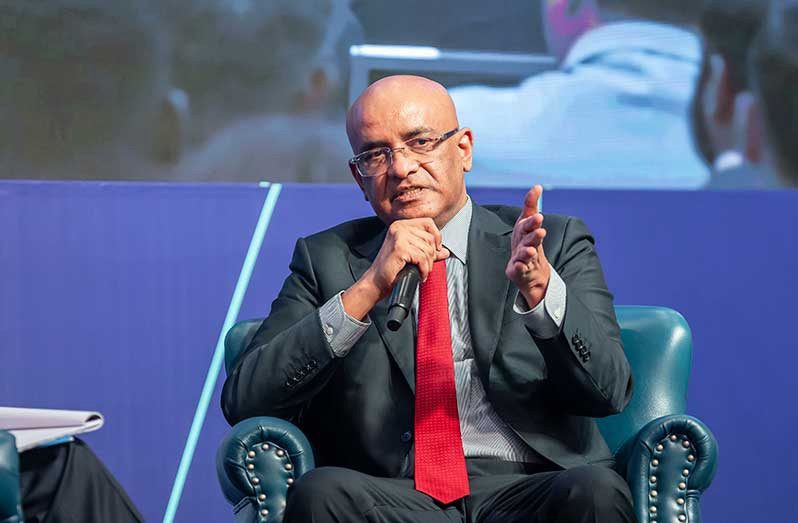-says building roads is not a ‘vanity project’ but part of an economic plan
WHILE opposition members and those aligned to the party are attempting to silence the government from campaigning on its achievements, People’s Progressive Party (PPP) General Secretary Dr. Bharrat Jagdeo has rejected these efforts.
During a press conference on Thursday at Freedom House, Georgetown, the General Secretary called out those figures who are attacking the government for speaking on how they have transformed Guyana.
While dismissing the attempts to dictate what the party must campaign on, Dr. Jagdeo underscored just a few of the government’s initiatives that have made a positive impact on the lives of Guyanese.
Also, although some have characterised the government’s initiatives and implementations as routine, the General Secretary shot back by putting the previous “shortsighted” APNU+AFC’s dismal track record on display, and the opposition’s current rhetoric that one cannot ‘eat roads’.
“You do have governments that don’t do any of this,” the General Secretary said while reflecting on the People’s National Congress-Reform (PNC-R)’s economic philosophy, which led Guyana down a path of economic despair for 28 years.
It is the capital budget that builds roads, schools, and water systems, Dr. Jagdeo emphasised, while recalling that the APNU+AFC’s capital budget was smaller than the PPP’s in 2014, which was its last before the Coalition took office in 2015.
He argued that the opposition’s economic philosophy prioritises recurrent spending over capital investments, noting that the recurrent budget grew massively under the APNU+AFC coalition government, which mainly focused on the then government’s personal interests.
The General Secretary, who also serves as Guyana’s Vice-President, affirmed that infrastructure remains central to his party’s campaign, given the transformative results that will result from it.
The road networks being created and expanded are not for vanity, the Vice- President highlighted, as they will open up opportunities and deal with transit woes.
“It’s not a vanity project; it is an organic part of implementing our economic plan,” he said.
But, as some are asking, what does this mean?
Dr. Jagdeo explained: “So, all the roads; every road that we got, particularly the highways, would have an impact on transit time and transit cost for goods and people, and if you can lower the cost of transit on the road, or the time that it takes you to move between point A to point B, then that’s money saved, or time saved.
“Everything can be quantified, because the time spent on the road, stuck in a vehicle, could be used in other pursuits, either leisurely pursuits, or on economic pursuits…These roads also open up opportunities for people.”
For example, the Heroes Highway will open up more lands for development purposes, both of private lands and State lands, he said.
He then pointed to the visible impact from the moment one drives out of South Georgetown, ranging from the commercial buildings, the booming employment opportunities, and even the recently opened Diamond Hospital.



.jpg)








